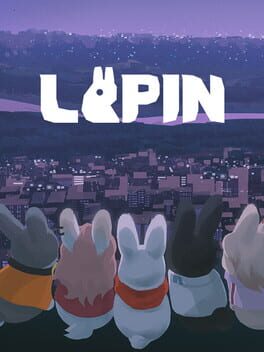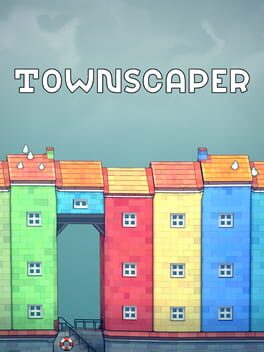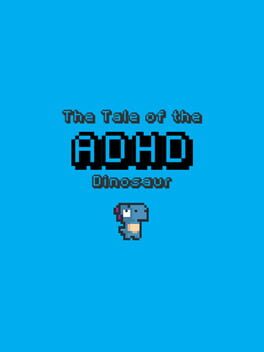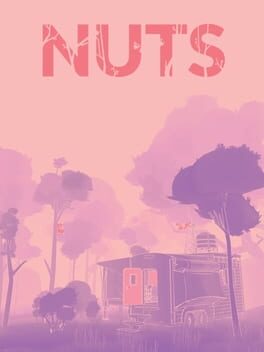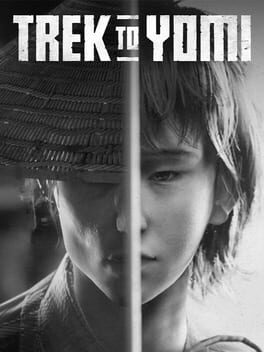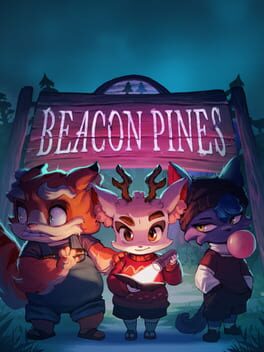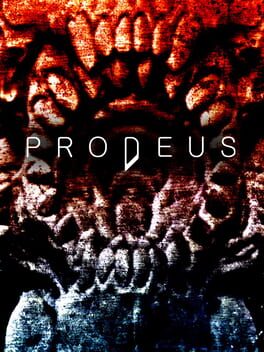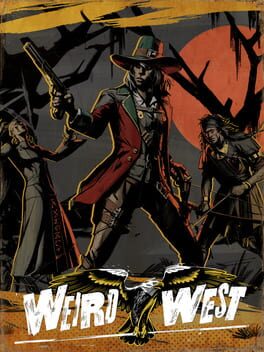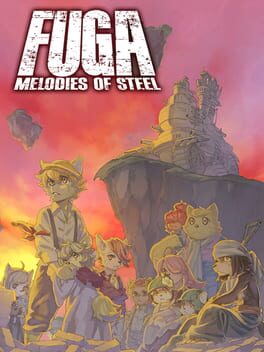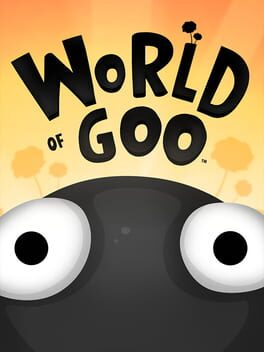MagoDaZueira
2022
The gameplay, while almost scratching the Celeste/precision-platforming itch, doesn’t feel very fluid. The character speed often made me feel hindered, while lacking game-feel and inconsistent hitboxes added friction on tip of it.
The platforming challenges themselves are quite well thought out and offer great progression of ideas, that end up converging to some more complex levels later on in the chapter.
The overall game loop pacing, though, has some problems. Some unnecessary story beats often stop the flow for longer than they should, especially since the main way of progressing your friendship with the other rabbits is by exhausting all the dialogue they have available at all times they appear. Considering they usually appear sequencially in a short span of time, these filler dialogues added greatly to the bloatedness of the game’s pacing.
I enjoyed the presentation, from hand-drawn graphics to the music. The story, where it isn’t excessive, is pretty interesting, and the gameplay, while problematic, has the engaging qualities of your usual precision-platformer. With that, Lapin, even if it had the potential to be quite better through some specific tweaks, was worth a playthrough.
The platforming challenges themselves are quite well thought out and offer great progression of ideas, that end up converging to some more complex levels later on in the chapter.
The overall game loop pacing, though, has some problems. Some unnecessary story beats often stop the flow for longer than they should, especially since the main way of progressing your friendship with the other rabbits is by exhausting all the dialogue they have available at all times they appear. Considering they usually appear sequencially in a short span of time, these filler dialogues added greatly to the bloatedness of the game’s pacing.
I enjoyed the presentation, from hand-drawn graphics to the music. The story, where it isn’t excessive, is pretty interesting, and the gameplay, while problematic, has the engaging qualities of your usual precision-platformer. With that, Lapin, even if it had the potential to be quite better through some specific tweaks, was worth a playthrough.
2020
Townscaper’s creator wanted it to be more of a toy rather than a game, and he’s accomplished that pretty well.
It is relaxing, and made me constantly think about what each citizen of the little town I was building would do and how they’d relate to other people in there.
The camera sometimes doesn’t work very well, at least on console, but even then the game doesn’t get frustrating at all, which speaks for how cozy and tightly built it really is.
Not much of a standout, but a worthwhile and unique game all the same.
It is relaxing, and made me constantly think about what each citizen of the little town I was building would do and how they’d relate to other people in there.
The camera sometimes doesn’t work very well, at least on console, but even then the game doesn’t get frustrating at all, which speaks for how cozy and tightly built it really is.
Not much of a standout, but a worthwhile and unique game all the same.
2022
I’ve never been a big horror games fan, and can’t say I’ve played a lot of the PS1 era ones this game seems to be inspired by.
What I can say, though, is that Signalis is awesome. The atmosphere is almost perfect, despite being a little hindered by a lack of visual variety. The story’s got style, impact and pacing done right, which can get hard when the narrative sets out for as much subjetivism and non-linearity as this game’s does.
Overall, I was enticed by Signalis’ vibes from the beginning of the game to the end of it. They’re a mix of tension, speculation and awe in a way I had no idea I’d find in this game, that ends up being much more than the sum of its parts.
What I can say, though, is that Signalis is awesome. The atmosphere is almost perfect, despite being a little hindered by a lack of visual variety. The story’s got style, impact and pacing done right, which can get hard when the narrative sets out for as much subjetivism and non-linearity as this game’s does.
Overall, I was enticed by Signalis’ vibes from the beginning of the game to the end of it. They’re a mix of tension, speculation and awe in a way I had no idea I’d find in this game, that ends up being much more than the sum of its parts.
2021
Nuts is quite self-contained, it doesn't try to grasp more than it can, and maybe because of that the gameplay got old fast, and the story didn't expand upon itself as much as it could.
The artstyle and overall vibes, though, were nailed. The restrained color palette choices are good, despite being confusing at times, and contribute to the simplicity of the game.
Maybe, had I liked its story more than I have (I think it can be a better one for some people), I would have enjoyed Nuts more as a whole. In the end, however, it was worthwhile to chase after some funny little squirrels and just enjoy the serene forests it presents during the 3 hours I beat it in.
The artstyle and overall vibes, though, were nailed. The restrained color palette choices are good, despite being confusing at times, and contribute to the simplicity of the game.
Maybe, had I liked its story more than I have (I think it can be a better one for some people), I would have enjoyed Nuts more as a whole. In the end, however, it was worthwhile to chase after some funny little squirrels and just enjoy the serene forests it presents during the 3 hours I beat it in.
2022
I like it when a game prioritizes and values its style above its other aspects, but that only works when it conveys something, when it serves a purpose based on the fact that it is a game
Trek to Yomi is not like that. It is a clear example of “style over substance”, but its style just doesn’t mean anything. Instead, when you try to interact with the world it presents it just rings hollow.
In the end, basically every facet of what makes this game a game feels lacking. And I don’t mean only the lackluster combat gameplay or all the action aspects it has, but actually the interactiveness with its world as a whole just never feels alive.
I must say, though, that I really do enjoy its artstyle, even if it doesn’t have enough substance supporting it, and I could find some fun in its combat, even though rarely.
It’s good that Trek to Yomi tries something that on the surface at least seems different, but it unfortunately isn’t as good as it could be.
Trek to Yomi is not like that. It is a clear example of “style over substance”, but its style just doesn’t mean anything. Instead, when you try to interact with the world it presents it just rings hollow.
In the end, basically every facet of what makes this game a game feels lacking. And I don’t mean only the lackluster combat gameplay or all the action aspects it has, but actually the interactiveness with its world as a whole just never feels alive.
I must say, though, that I really do enjoy its artstyle, even if it doesn’t have enough substance supporting it, and I could find some fun in its combat, even though rarely.
It’s good that Trek to Yomi tries something that on the surface at least seems different, but it unfortunately isn’t as good as it could be.
1990
One of the best Mario 2D games when it comes to how he controls, and its many secrets make the world feel much more alive than the previous installments, and honestly even more enticing than most the more recent New series games
I overall prefer SMB 3’s difficulty and level design in that it tries out so many different ideas across its levels, and maybe I like that one better than World because of that.
This is, however, an undeniable step forward when it comes to what Mario games are today, and I really hope that they have been taking some inspiration from Mario World and 3 when creating the upcoming Mario Wonder, because the unique charm and quirkiness it seems to be pursuing are abundant in these games.
I overall prefer SMB 3’s difficulty and level design in that it tries out so many different ideas across its levels, and maybe I like that one better than World because of that.
This is, however, an undeniable step forward when it comes to what Mario games are today, and I really hope that they have been taking some inspiration from Mario World and 3 when creating the upcoming Mario Wonder, because the unique charm and quirkiness it seems to be pursuing are abundant in these games.
2022
Beacon Pines' narrative has an engaging pacing and a is crafted with a finesse I didn't expect to find here.
The story beats are... kinda intense. The always present awesome music is explosive at most times, and the unique art style tirelessly begs you to look at every inch of it. The variety of the narrative tones keep this intensity from feeling bland and turns it, instead, into a way of reinforcing the story being told.
I really enjoyed my time with this game, and for me it almost perfectly shows the ways that short, story focused games can add an unique flair to the narrative that wouldn't be so easily achievable on a game with a larger scope. It feels different, and I love it for that.
The story beats are... kinda intense. The always present awesome music is explosive at most times, and the unique art style tirelessly begs you to look at every inch of it. The variety of the narrative tones keep this intensity from feeling bland and turns it, instead, into a way of reinforcing the story being told.
I really enjoyed my time with this game, and for me it almost perfectly shows the ways that short, story focused games can add an unique flair to the narrative that wouldn't be so easily achievable on a game with a larger scope. It feels different, and I love it for that.
2020
2022
I really wanted to like Weird West, but after taking my time with it and exploring the stories and gameplay possibilities for over 20 hours I unfortunately can't say I do.
Most of the game's problems stem from its limitations. It's got some interesting ideas going for it, but in actuality most of them lack the depth an immersive-sim of this scale needs.
When approaching combat situations, for example, you are given little choice on how to approach them:
- For stealth, because there aren't truly unique contextual interactions with the scenarios or abilities that change the way you play in furtiveness, the gameplay loop when approaching battles this way stays the same throughout most of the game.
- When going guns blazing, it's possible to play through some fun moments, but the skills, again, don't provide a lot of clever interactions with the game's systems, being much closer to standard top down hack-and-slash abilities, which is a problem when the game so clearly tries to be an experience more akin to something like Dishonored. On top of that, there is a big lack of guns variety, and the ones I found at the start of the game were basically the same ones I had at the end, just with a higher damage output. Also, for me, even though mostly decent, the gun gameplay felt floaty and wasn't satisfactory enough.
All that, combined with the blatant repetition of scenarios and assets and lack of real consequence and choice (both through gameplay and story, besides some exceptions on the latter), result in a game that quickly runs out of ideas to show to the player, which is a major flaw in an immersive-sim, which should reward creativity and scatter clever ideas through the world, instead of the shallowness shown here.
The story never really stood out for me, and neither did the sidequests. The writing itself, though, is mostly pretty good, being concise and not-overstaying when delivering the necessary information, and there were some pretty funny characters (namely the tree and Joe from the Pigman journey), which is a nice fit for the whole "Weird" setting of the game.
Speaking of the setting, there is the atmosphere and aesthetics. I think this part of Weird West is really great, with a cohesive art style that I enjoyed through and through (really like 3d cartoonish weird visuals) and subtle but ever-present music and SFX, especially the latter, which pulls you into the game's world at all times.
So yeah, there are some good things about the game, and I think there is a big chance one could enjoy playing through it much more than I did. For me personally, however, the flaws Weird West has are ones that greatly lessen the whole game, and I just couldn't, besides being into the atmosphere and style it presents, like it, as much as I wish I did.
Most of the game's problems stem from its limitations. It's got some interesting ideas going for it, but in actuality most of them lack the depth an immersive-sim of this scale needs.
When approaching combat situations, for example, you are given little choice on how to approach them:
- For stealth, because there aren't truly unique contextual interactions with the scenarios or abilities that change the way you play in furtiveness, the gameplay loop when approaching battles this way stays the same throughout most of the game.
- When going guns blazing, it's possible to play through some fun moments, but the skills, again, don't provide a lot of clever interactions with the game's systems, being much closer to standard top down hack-and-slash abilities, which is a problem when the game so clearly tries to be an experience more akin to something like Dishonored. On top of that, there is a big lack of guns variety, and the ones I found at the start of the game were basically the same ones I had at the end, just with a higher damage output. Also, for me, even though mostly decent, the gun gameplay felt floaty and wasn't satisfactory enough.
All that, combined with the blatant repetition of scenarios and assets and lack of real consequence and choice (both through gameplay and story, besides some exceptions on the latter), result in a game that quickly runs out of ideas to show to the player, which is a major flaw in an immersive-sim, which should reward creativity and scatter clever ideas through the world, instead of the shallowness shown here.
The story never really stood out for me, and neither did the sidequests. The writing itself, though, is mostly pretty good, being concise and not-overstaying when delivering the necessary information, and there were some pretty funny characters (namely the tree and Joe from the Pigman journey), which is a nice fit for the whole "Weird" setting of the game.
Speaking of the setting, there is the atmosphere and aesthetics. I think this part of Weird West is really great, with a cohesive art style that I enjoyed through and through (really like 3d cartoonish weird visuals) and subtle but ever-present music and SFX, especially the latter, which pulls you into the game's world at all times.
So yeah, there are some good things about the game, and I think there is a big chance one could enjoy playing through it much more than I did. For me personally, however, the flaws Weird West has are ones that greatly lessen the whole game, and I just couldn't, besides being into the atmosphere and style it presents, like it, as much as I wish I did.
Fuga was, for me, a highly enticing and charming adventure overall. The gameplay loop, for half chunk of the game, worked well, in that, maybe because of its streamlined JRPG structure, every system seamlessly fed into each other.
So yeah, just saying that I really do like this game and can feel all the heart and passion that went into creating it. I had never played a CyberConnect game before, but am now eager to do so. Fuga is unique and brings, for the most part, battles that feels like puzzles while also having great risk/reward and tension/relief gameplay structure. The things this game gets right alone made it worth it for me.
Even with all that, though, I can point out a lot of major things that hinder the overall experience from reaching the full potencial it has.
Starting out the bad stuff, then, I must admit that the game does overstay its welcome, so that after around 10 - 15 hours (beat it at ~20) I started to notice that some of its parts were not working that well anymore. Its difficulty, while engaging at first, was, at a certain point, completely overcome by my finding of optimal strategies, and even though I continued to iterate and experiment upon some different party combos, the challenge just wasn't there anymore, and the battles started to feel unnecessarily long and repetitive, for my solution to most of them was kinda same, even more due to a certain degree of repetition of skills across party members.
The intermissions were interesting, but after the point when the game started to drag out more there were not a lot of incentives for me to keep up the micromanaging of resources (namely AP) I set out to do doing at the start of my run.
This part also circles back to the battles, in which at a certain point I had like almost 20 high SP recovery items which, even when using lots of highly SP-consuming skills, I only had to use 1 or 2 of per chapter. This, too, reduced the necessity of a stronger strategy, and with that the stakes of the battles were also diminished, which in turn affected the stakes of the overarching war story in general. I ended up dying only once throughout the entirety of the game, at the beginning/middle of it, because of some dumb decisions I made in a fight, since I didn't have enough familiarity with the fights to understand the streamlining process of each of them yet.
Speaking of stakes, there is the soul-cannon, and while it seems to be a cool idea on the surface, the thought of using it never crossed my mind, since I faced no hardships that would lead me to. If the cannon were in the game simply as tone-setter or stakes-elevating mechanism, it would be ok, I'd just choose to never use it and matters would be settled. The problem is that, much like in Mass Effect 3 where, because of the suicide mission at the end of 2, there would be no way of the devs building a strong story centered around its characters since half of them could have straight up died in the last game, they effectively didn't, here in Fuga any of the characters could be shot out of the cannon and died at any moment. This complicates things, since there are close to none deep character development because of that, those being left out for "link events" during the intermissions, which (even though I didn't see all of them) usually are filler and don't bring much new things to the table, while the main story could, if more fleshed out.
All of that, though, didn't break the game at all for me. The combat kept being fun at times, even after the 15 hour mark, and the longer battles were not such a slog since I had podcasts on in the background during most of them at that point. I still think it is worth playing through, and still believe it is an 8 out of 10 game, a great one, stopped from reaching the peaks it could because of a handful of problems.
So yeah, just saying that I really do like this game and can feel all the heart and passion that went into creating it. I had never played a CyberConnect game before, but am now eager to do so. Fuga is unique and brings, for the most part, battles that feels like puzzles while also having great risk/reward and tension/relief gameplay structure. The things this game gets right alone made it worth it for me.
Even with all that, though, I can point out a lot of major things that hinder the overall experience from reaching the full potencial it has.
Starting out the bad stuff, then, I must admit that the game does overstay its welcome, so that after around 10 - 15 hours (beat it at ~20) I started to notice that some of its parts were not working that well anymore. Its difficulty, while engaging at first, was, at a certain point, completely overcome by my finding of optimal strategies, and even though I continued to iterate and experiment upon some different party combos, the challenge just wasn't there anymore, and the battles started to feel unnecessarily long and repetitive, for my solution to most of them was kinda same, even more due to a certain degree of repetition of skills across party members.
The intermissions were interesting, but after the point when the game started to drag out more there were not a lot of incentives for me to keep up the micromanaging of resources (namely AP) I set out to do doing at the start of my run.
This part also circles back to the battles, in which at a certain point I had like almost 20 high SP recovery items which, even when using lots of highly SP-consuming skills, I only had to use 1 or 2 of per chapter. This, too, reduced the necessity of a stronger strategy, and with that the stakes of the battles were also diminished, which in turn affected the stakes of the overarching war story in general. I ended up dying only once throughout the entirety of the game, at the beginning/middle of it, because of some dumb decisions I made in a fight, since I didn't have enough familiarity with the fights to understand the streamlining process of each of them yet.
Speaking of stakes, there is the soul-cannon, and while it seems to be a cool idea on the surface, the thought of using it never crossed my mind, since I faced no hardships that would lead me to. If the cannon were in the game simply as tone-setter or stakes-elevating mechanism, it would be ok, I'd just choose to never use it and matters would be settled. The problem is that, much like in Mass Effect 3 where, because of the suicide mission at the end of 2, there would be no way of the devs building a strong story centered around its characters since half of them could have straight up died in the last game, they effectively didn't, here in Fuga any of the characters could be shot out of the cannon and died at any moment. This complicates things, since there are close to none deep character development because of that, those being left out for "link events" during the intermissions, which (even though I didn't see all of them) usually are filler and don't bring much new things to the table, while the main story could, if more fleshed out.
All of that, though, didn't break the game at all for me. The combat kept being fun at times, even after the 15 hour mark, and the longer battles were not such a slog since I had podcasts on in the background during most of them at that point. I still think it is worth playing through, and still believe it is an 8 out of 10 game, a great one, stopped from reaching the peaks it could because of a handful of problems.
2019
One of the most wholesome games out there, extremely charismatic with its unique 3d pixel art and really funny characters. As far as I’m concerned, the game absolutely nails everything it sets out to do
Playing A Short Hike is, in its entirety, a breath of fresh air, one that is suitable for every situation, even if you don’t think you need said fresh air
Playing A Short Hike is, in its entirety, a breath of fresh air, one that is suitable for every situation, even if you don’t think you need said fresh air
2019
There isn’t much to say that hasn’t been already, but just wanna say I’m really impressed by how enticing and addicting this gameplay loop gets. I’ve beaten it at around 150h, the longest it ever took for me to finish a game, and I just never grew tired of it. So much so that now I feel like I gotta play the rest of the Personas, SMT and even the spinoffs, because those 150 hours went by so fluidly.
P5R got immaculate vibes, beacause of its characters, music (OMG the music) and overall style, and is truly something unique. Sure, it got flaws, but its vibes just straight up override all of them.
P5R got immaculate vibes, beacause of its characters, music (OMG the music) and overall style, and is truly something unique. Sure, it got flaws, but its vibes just straight up override all of them.
2022
Immortality has layer upon layer of storytelling, each composed of their own enticing narrative and connected to the others in unimaginably tight ways. On top of that, each of these said layer brings thought-provoking ideas on life and art, especially with well crafted critiques on the latter and its current state.
I loved it.
I loved it.
2008
This game wasn’t very fun to play. As a puzzle game, it feels outdated, with a lot of design ideas that feel quite weird nowadays (some were probably even considered bad at the time). Also, the puzzles rarely intrigued me or developed ideas i found to be smart ones.
I, however, don’t think playing it was a total waste of time, since it’s interesting to see how games, especially indies, have evolved since then.
I, however, don’t think playing it was a total waste of time, since it’s interesting to see how games, especially indies, have evolved since then.
